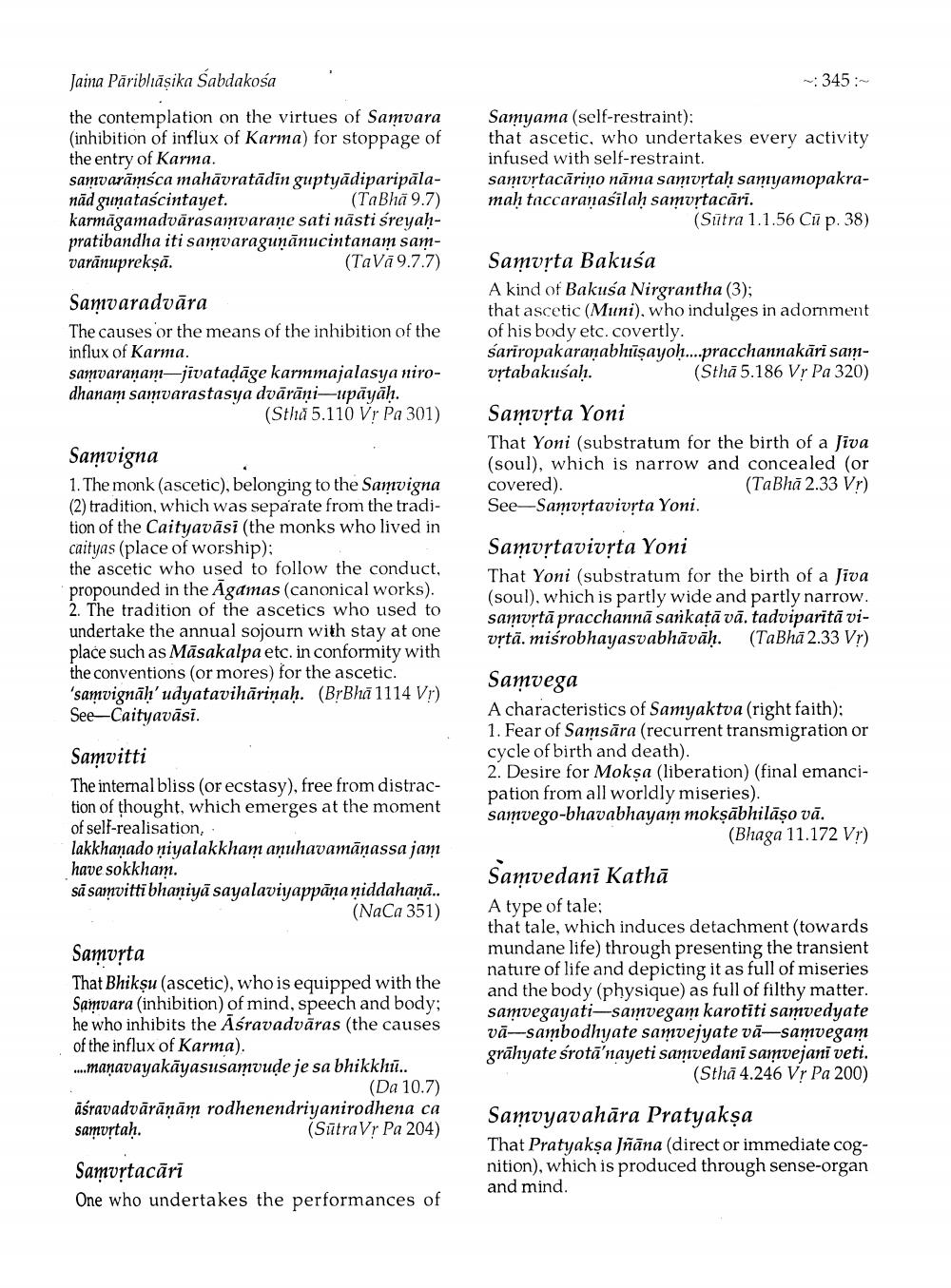________________
Jaina Pāribhāṣika Sabdakosa
345 :
the contemplation on the virtues of Samvara (inhibition of influx of Karma) for stoppage of the entry of Karma. samvarāmsca mahāvratādin guptyādiparipālanād gunataścintayet.
(Tabhä 9.7) karmāgamadvārasamvarane sati nästi sreyahpratibandha iti samvaraguņānucintanam samvarānuprekşā.
(Tavā 9.7.7)
Samyama (self-restraint): that ascetic, who undertakes every activity infused with self-restraint. samurtacāriņo nāma samvrtah samyamopakramah taccaranasilah samvrtacāri.
(Sūtra 1.1.56 Cū p. 38)
Samvaradvāra The causes or the means of the inhibition of the influx of Karma. samvaranam-jīvatadāge karmmajalasya nirodhanam samvarastasya dvārāņi-upāyāḥ.
(Stha 5.110 Vr Pa 301)
Samvrta Bakusa A kind of Bakusa Nirgrantha (3); that ascetic (Muni), who indulges in adornment of his body etc. covertly. sariropakaranabhuīşayoh....pracchannakāri samvrtabakusah.
(Sthā 5.186 Vr Pa 320)
Samvrta Yoni That Yoni (substratum for the birth of a Jiva (soul), which is narrow and concealed (or covered).
(TaBhā 2.33 Vr) See-Samvrtavivrta Yoni.
Samvigna 1. The monk (ascetic), belonging to the Samvigna (2) tradition, which was separate from the tradition of the Caityavāsi (the monks who lived in caityas (place of worship); the ascetic who used to follow the conduct, propounded in the Agamas (canonical works). 2. The tradition of the ascetics who used to undertake the annual sojourn with stay at one place such as Māsakalpa etc. in conformity with the conventions (or mores) for the ascetic. 'samvignāḥ' udyatavihāriņaḥ. (BrBhā 1114 Vr) See-Caityavāsi.
Samurtavivrta Yoni That Yoni (substratum for the birth of a Jiva (soul), which is partly wide and partly narrow. samvrtā pracchannā sarkatā vā. tadviparitā vivrtā. miśrobhayasvabhāvāḥ. (TaBhā 2.33 Vr)
Samvitti The internal bliss (or ecstasy), free from distraction of thought, which emerges at the moment of self-realisation, lakkhanado niyalakkham anuhavamānassa jam have sokkham. sā samvitti bhaniyā sayalaviyappāņa niddahan...
(NaCa 351)
Samvega A characteristics of Samyaktva (right faith); 1. Fear of Samsāra (recurrent transmigration or cycle of birth and death). 2. Desire for Moksa (liberation) (final emancipation from all worldly miseries). samvego-bhavabhayam mokṣābhilāṣo vā.
(Bhaga 11.172 Vr)
Samvrta That Bhiksu (ascetic), who is equipped with the Samvara (inhibition of mind, speech and body; he who inhibits the Aśravadvāras (the causes of the influx of Karma). ...manavayakāyasusamvude je sa bhikkhu..
(Da 10.7) äśravadvārāņām rodhenendriyanirodhena ca samurtaḥ.
(SūtraVr Pa 204)
Samvedani Kathā A type of tale; that tale, which induces detachment (towards mundane life) through presenting the transient nature of life and depicting it as full of miseries and the body (physique) as full of filthy matter. samvegayati-samvegam karotiti samvedyate vā-sambodhyate samvejyate vā-samvegam grāhyate śrotā'nayeti samvedani samvejani veti.
(Stha 4.246 VỊ Pa 200)
(St
Samvyavahāra Pratyakşa That Pratyakşa Jñāna (direct or immediate cognition), which is produced through sense-organ and mind.
Samvrtacāri One who undertakes the performances of




